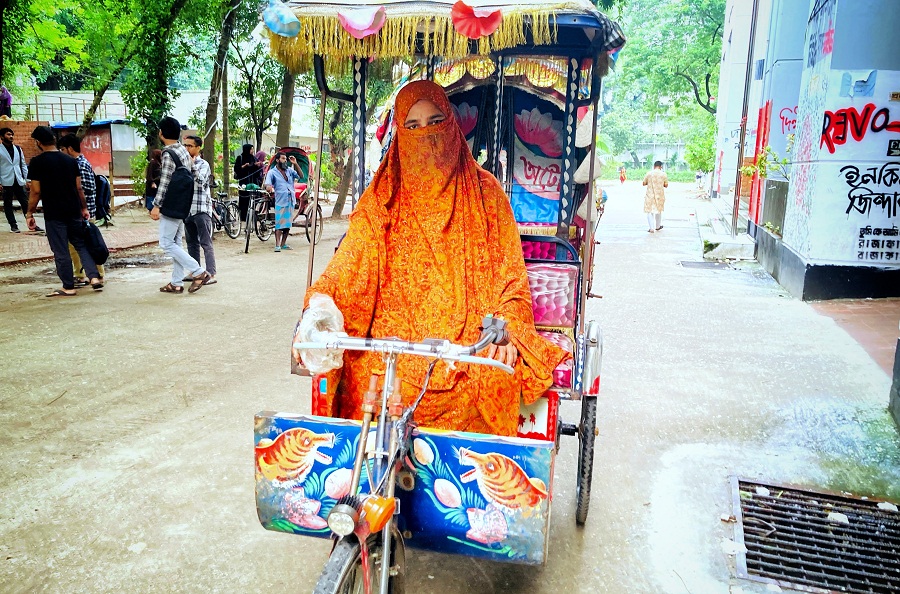
Published :
Updated :

In Bangladesh, rickshaws are the most well-liked and extensively used transportation. Many people who live in Dhaka commute by rickshaw, which men typically operate. Women also pull rickshaws, but they are rare in the city.
Recently, a lady named Sajeda Begum has been pulling a rickshaw on the streets of Mohammadpur for the past one and a half years.
After her husband abandoned her, Sajeda and her daughter are now the sole members of the family who rely on one another. She has no additional family members. Those who have distant relatives do not keep in touch with her.
Mukta, her daughter, is eighteen and has been suffering from kidney issues. According to Sajeda, she began pulling a rickshaw to cure her daughter's kidney condition and give her a decent life.
She used to work in garments, but she can no longer do it because twice a week, her daughter has to be taken to the hospital for dialysis.
Sajeda explains that daily time is needed for other work, and a steady income is not guaranteed. As a result, she reasoned that she would choose work that paid whenever she worked at her convenience.
Sajeda says, "I think rickshaw pulling is self-sufficient work with no obligations. I could do other work instead of pulling a rickshaw, but I have noticed that most people pull rickshaws to run their families. And I don't consider myself weak. So I asked myself, If they can, then why can't I?"
Sajeda buys the rickshaw in installments. She has to pay for installments of Tk 1200 twice a month. She earns approximately 700 to 800 TK daily to support her family. She occasionally borrows money from her acquaintances when she needs more. When she gets paid after pulling the rickshaw, she promptly returns it to them.
Considering her safety, Sajeda always tries to get home before dark. Talking to her, it is also known that people often get impressed by her rickshaw-pulling skills and want to pay her extra fare.
"My rickshaw passengers are never disappointed. They commend my rickshaw-pulling abilities after we arrive at a particular location," she continues.
However, she claims she often hears harsh words from men while pulling a rickshaw. Many males use derogatory language to denigrate and demoralize her. Sometimes, people refuse to ride in her rickshaw because they think she is incompetent.
"People assume I can't pull a rickshaw properly because I'm a woman. I never listen to any of them. Because no one can assist me, they can only talk behind my back. I have to look after the family," Sajeda remarks.
Despite all obstacles, she puts her heart and soul into hard work to earn money. She is not backing down from her job. As she lifts the burden of the passengers, she also lifts the burden of all the hardships of her life.
The police often advise her to find another work after observing her struggles.
She is also frequently told that she won't have to work any harder if she remarries. But Sajeda is adamant about her choice. She is unwilling to rely on others. Her goal is to become an independent lady, which she is.
Today, women and men play equal roles in every industry. Sajeda Begum is another example who demonstrates that nothing in this world is beyond women's capabilities.
Superhero characters are a common sight in films. And it would not be incorrect to refer to this female rickshaw puller as a superhero.
nandinyahasunn@gmail.com


 For all latest news, follow The Financial Express Google News channel.
For all latest news, follow The Financial Express Google News channel.